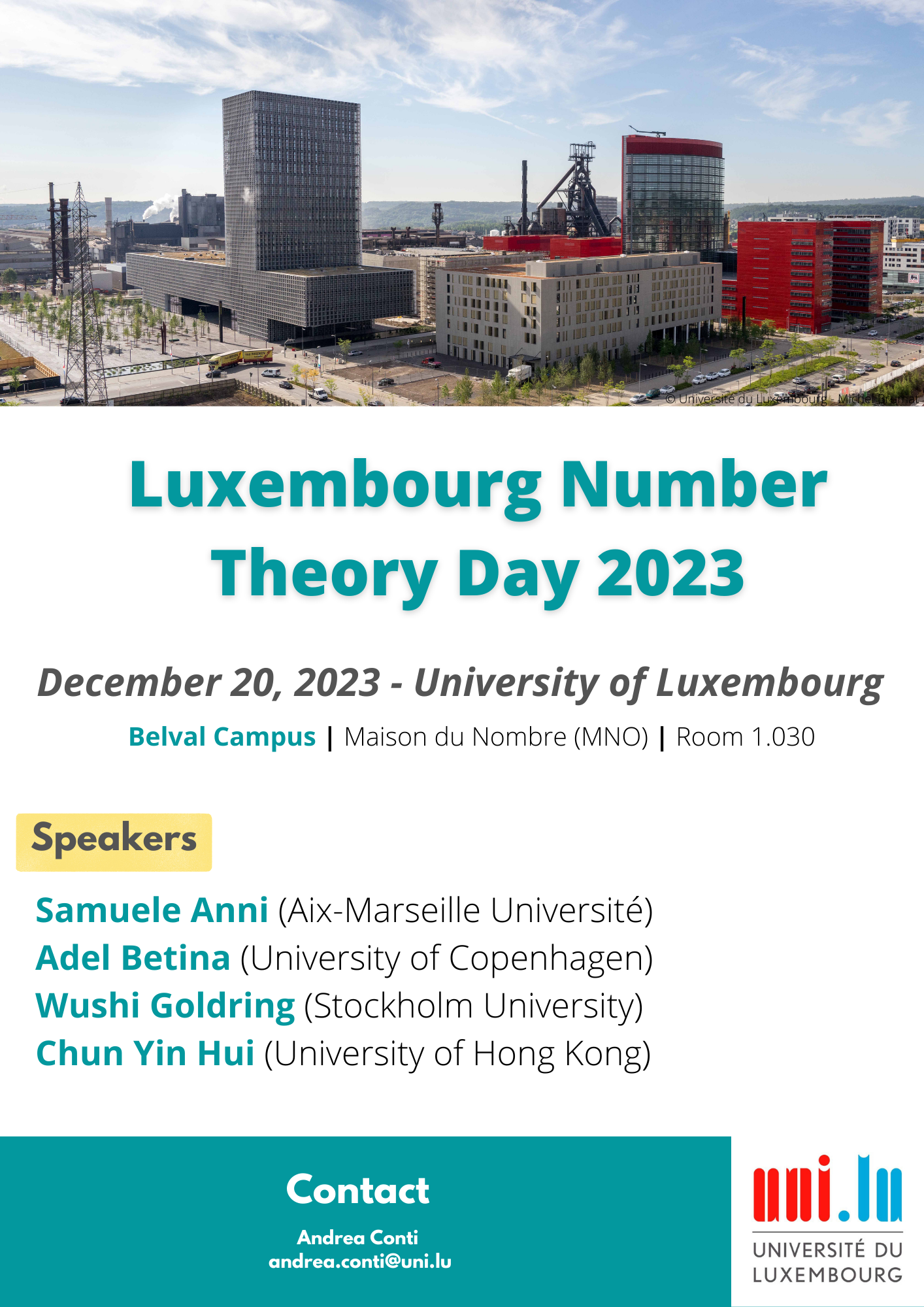Luxembourg Number Theory Day 2023

The Luxembourg Number Theory Day will take place on December 20, 2023, on the Esch-Belval Campus of the University of Luxembourg. The talks will be held in room MNO 1.030 of the Maison du Nombre.
Speakers
Samuele Anni (Aix-Marseille Université)Adel Betina (University of Copenhagen)
Wushi Goldring (Stockholm University)
Chun Yin Hui (University of Hong Kong)
Contact
Andrea Conti, andrea.conti at uni.luLocation
All of the talks will take place in room MNO 1.030 on the 1st floor of the Maison du Nombre at 6, Avenue de la Fonte, Esch-sur Alzette. You can find it on Google Maps or OpenStreetMap.We will also transmit the talks on Webex at the coordinates:
https://unilu.webex.com/unilu/j.php?MTID=m2c6fa42d707daa875b26c93a05e147a9
Meeting number: 2780 001 5420
Password: sP3uHmGKs43
Schedule
| Time | Speaker | Title |
| 9:30-10:00 | Coffee | |
| 10:00-11:00 | Samuele Anni | Modular Galois representations: twists and Diophantine applications |
| 11:00-11:15 | Coffee break | |
| 11:15-12:15 | Adel Betina | Eigenvarieties for non-cuspidal automorphic forms over PEL Shimura varieties for GU(2,1) |
| 12:15-13:45 | Lunch break | |
| 13:45-14:45 | Chun Yin Hui | Monodromy of subrepresentations and irreducibility of low degree automorphic Galois representations |
| 14:45-15:00 | Coffee break | |
| 15:00-16:00 | Wushi Goldring | Propagating algebraicity via functoriality (online) |
Abstracts
Samuele Anni Modular Galois representations: twists and Diophantine applications
Let l be a prime number. To any mod l modular form, which is an eigenform for all Hecke operators, it is associated a 2-dimensional residual representation of the absolute Galois group of the rationals. A residual modular Galois representation can arise as twist of a representation of lower conductor. In this talk, I will address this problem and describe applications towards solving Diophantine equations.
Adel Betina Eigenvarieties for non-cuspidal automorphic forms over PEL Shimura varieties for GU(2,1)
We construct eigenvarieties for unitary groups GU(2,1) parametrizing systems of eigenvalues of overconvergent and locally analytic p-adic automorphic forms including Eisenstein families. This is achieved by refining the method of Andreatta--Iovita--Pilloni for cuspidal automorphic forms. The main novelty is the construction of subsheaves of the p-adic automorphic sheaves of Andreatta--Iovita--Pilloni by imposing a condition on the sections at the boundary of a toroidal compactification.
The purpose of this construction is to prove the exceptional zeros conjecture of Katz p-adic L-functions for CM fields via p-adic Eisenstein congruences. This talk is based on a joint work with Ming-Lun Hsieh.
Wushi Goldring Propagating algebraicity via functoriality
Some automorphic representations are known to have algebraic Hecke eigenvalues for geometric reasons. For most types of automorphic representations over number fields, the algebraicity of the Hecke eigenvalues is not known. In some cases the eigenvalues are conjectured to be algebraic, while in others they are conjectured to be transcendental. There seems to be no conjectural characterisation of when the Hecke eigenvalues should be algebraic.
We study which automorphic representations \pi admit a Langlands functoriality transfer \pi' along an L-morphism with finite kernel such that (1) \pi' is known to have algebraic Hecke eigenvalues for geometric reasons or (2) \pi' was previously conjectured to have algebraic Hecke eigenvalues. This propagates the algebraicity from \pi' to \pi. In the negative direction, we give several obstructions to the existence of \pi', based both on the infinitesimal character and on the `complex conjugation part' of the archimedean Langlands parameter. In particular, this gives a conceptual explanation for why \pi' doesn't exist when \pi arises from a Maass form. In the positive direction, we exhibit new cases of algebraicity of Hecke eigenvalues for automorphic representations for which no direct link to geometry is known. In some of these cases, we also associate the Galois representations predicted by the Langlands correspondence.
Chun Yin Hui Monodromy of subrepresentations and irreducibility of low degree automorphic Galois representations
Given a compatible system $\{\rho_\lambda : \Gal_K \to \GL_n(E_\lambda)\}_\lambda$ of semisimple $\lambda$-adic representations of a number field $K$ satisfying mild local conditions, we prove that for almost all $\lambda$ any type A irreducible subrepresentation of $\rho_\lambda\otimes\overline\Q_\ell$ is residually irreducible. We apply this result and some potential automorphy theorem to prove that $\rho_\lambda\otimes\overline\Q_\ell$ is residually irreducible for almost all $\lambda$ if the compatible system is attached to a regular algebraic, polarized, cuspidal automorphic representation of $\GL_n(\A_\Q)$ and $n \leq 6$.